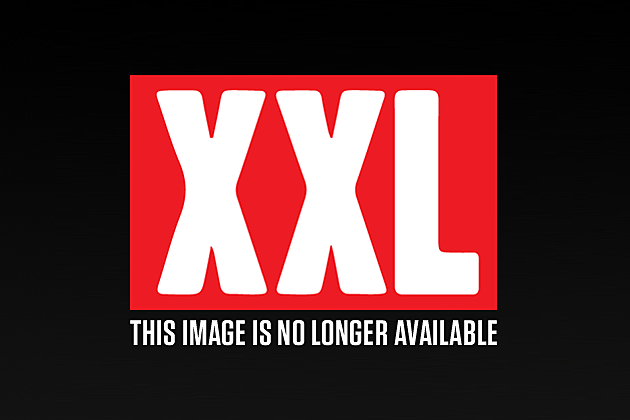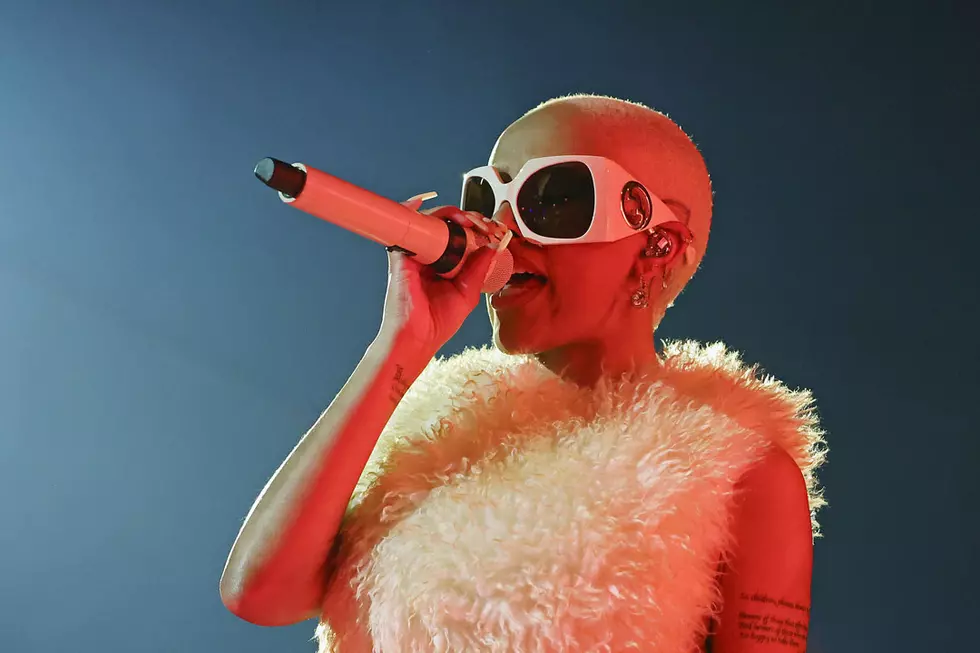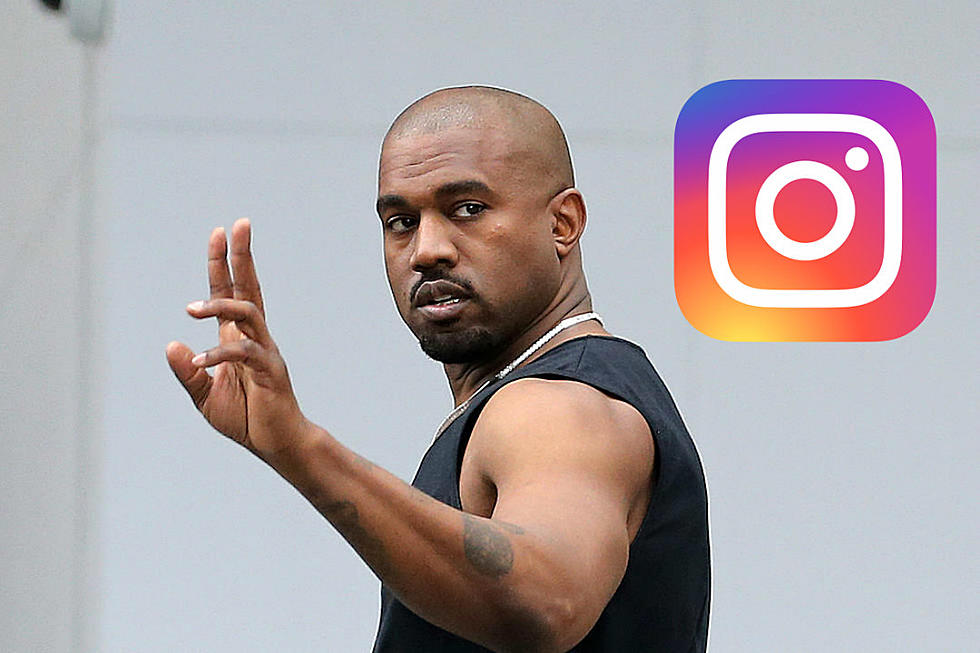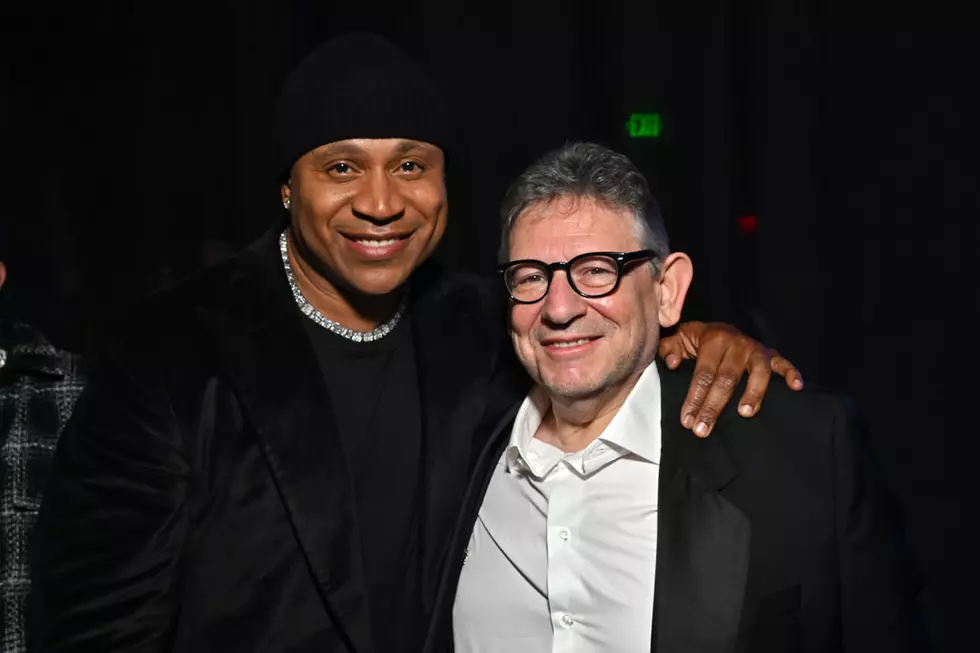
Rick Rubin Reflects On His Contributions To 10 Iconic Hip-Hop Albums
Photo © Glen E. Friedman
Rick Rubin works harder than you. He's wiser, more interesting and way more connected than you, too. Just ask Kanye West, who recently took a trip to Rubin's Malibu home as he wrapped up his sixth solo LP, Yeezus. During his visit, Kanye let Rubin hear a disorganized "mountain of music," which Rubin then proceeded to sort through and refine until he and West came up with the challenging, thought-provoking and critically-acclaimed Yeezus. Some have been quick to call Rubin the savior of the album, but really, that's just what Rubin does: he helps major artists focus, finds their strongest suits and in the process gets them to make their best possible work.
More recently, Rubin has been seen in a series of commercials promoting Jay-Z's forthcoming Magna Carta Holy Grail, Jay's 12th studio album. In the commercials, Rubin goes from listening to the album while laying on a couch barefoot to listening to Jay describe the album while sitting up on said couch barefoot. It might sound weird, but it's exciting; you not only get to see Jay in his element, you also get a glimpse of the typically reclusive Rick, doing what one assumes he does best—listening. While Rubin had no hand in actually producing the project, as Jay's longtime friend he listened to most of Magna Carta and agreed to appear in the documentary to discuss its songs. As far as obsessively-private public figures go, there's no way to peg Rick Rubin, or guess what he will or won't do.
There also really isn't much to say about the man that hasn't been said. He was an early adopter and curator of modern hip-hop culture; he's a visionary producer who discovered a young and aggressive LL Cool J, a wily bunch of punk kids named The Beastie Boys and the outspoken radio DJ Chuck D and released their early works via Def Jam Recordings (a label he founded in his NYU dorm room); and he's a mythical zen master who helps create timeless, cross-generational music all while sitting in the Malibu sand and stroking his flowing beard (well, that last part may be an exercise in myth-making).
In his nearly 30-year career, Rubin has not only been instrumental in helping hip-hop cross over into the mainstream, he's also followed his unfaltering instincts into working on some of the genre's most important works. Simply put, Rick Rubin's got a golden ear, and more importantly, a golden intuition. He doesn't simply understand the zeitgeist—he embodies it. And by chasing the songs that move him, he's happened upon some of hip-hop's most progressive and commercially successful artists and projects.
In a candid phone interview, the living legend took a retrospective look back at his storied career and spoke to XXL about his contributions to ten of the most important hip-hop albums ever released, from LL Cool J's Radio to Lil Jon's Crunk Juice to Jay-Z's The Black Album.
LL Cool J—Radio (1985)
"At the time, it was the beginning of Def Jam, and the rap records that you could buy didn't really sound like hip-hop records. Even though there were people rapping on them, they sounded more like R&B and club records with people rapping on them, whereas if you went to a hip-hop party the DJs would be cutting up breaks—it would be very different with the DJ and MC as opposed to the records you could buy on Sugar Hill, which was just bands playing music with a guy rapping.
"So, with LL's record, it was kind of the prototype of being a true hip-hop album, stripped down to drum machines, scratching, vocals and maybe a piano or a couple other elements that were used as architectural elements in this minimal landscape. It was really about getting as close to the rawness of what hip-hop really felt like at a time when records didn't really sound like that yet.
"We just tried to make records that we loved. We might make a record then bring it to Danceteria that night and play it, just to get a point of reference of what it sounded like over a big system. Musically there wasn't really [any cultural references] other than going out to a club and feeling the energy of the DJ cutting up break beats. The minimalism of that, and how important the DJ was in hip-hop culture was another thing.
"So many of the MCs that I've come in contact with since making that record...I can't think of anyone who doesn't reference LL Cool J as one of the people who influenced them as an MC."
The Beastie Boys—Licensed To Ill (1986)
"That one was recorded over a long period of time, and I think one of the reasons it's as good as it is is that each song really has its own life, which I don't think would've been the case had we made the whole album in two or three months. It wouldn't have had the breadth and depth that it does, especially musically. That was kind of two years of our lives. Not two years of our lives in the studio every day, but we'd work on a song for a couple of days, then we might not go back in the studio for another month or six weeks, then whatever was sort of speaking to us at that moment would be the next one. So it really came together over time, with all of the influences—both of the day and the influences we'd grown up with. I'd grown up with Led Zeppelin and AC/DC and more hard rock, and they'd grown up on punk rock, and you can feel all of those influences in that record.
"Again, we were making it for us and our friends, and if it would've sold 25,000 copies we would've been ecstatic. [Laughs] Really. The fact that so many people liked it was really a shock to us, because it's such an inside album. There's so many inside jokes and it's such a personal album. And it's ridiculous. The stuff they talk about is really ridiculous, and it entertained us, but we never imagined that it would entertain anyone else.
"I think in some ways [their sophomore album] Paul's Boutique was a reaction to Licensed To Ill, because I think they wanted to do something different, and I think Paul's Boutique, in their mind, was different. I remember hearing Paul's Boutique and it blowing my mind. I really loved it. I thought it was the future. When it came out, it wasn't very well-received, but it was really a brilliant album."
Run-D.M.C.—Raising Hell (1986)
"Because we'd already done the Beasties and the Def Jam singles, there was a rawness about the records we were making that, while Run-D.M.C. records had a rawness compared to everything else, there was still more slick production on their records before [Raising Hell]. So this was the first one in the Def Jam mold of really being stripped-down and really being about the personality of the drum machine. It wasn't drum machines trying to sound like real drummers, it was drum machines trying to sound like drum machines, and using different drum machines playing off each other. On top of that, Jam Master Jay was an incredible DJ and he would put in the coolest stuff, so it was closer to that that raw hip-hop experience.
"I liked things about all the Run-D.M.C. records. I can remember when I first heard 'Sucker MCs,' and how much that meant to me. And the song 'Jam Master Jay' really meant a tremendous amount to me, as a fan. They were my favorite group at the time, and it was my dream to get to work with them, and then I did and it was an unbelievable experience.
"I think one of their breakthroughs was the fact that we did ['Walk This Way'] with Aerosmith, because it allowed people who didn't really understand rap music to hear it in a form that wasn't so foreign to them, and it helped connect the dots for people who thought that hip-hop wasn't music."
Public Enemy—It Takes A Nation Of Millions To Hold Us Back (1988)
"I played more of an advisory role with Public Enemy. I really trusted them to make the music that they wanted to make, and the way The Bomb Squad worked with them...they created their whole own world of music. They would always ask me to come to the studio and I would check in on things and I'd make suggestions and stuff, but for the most part, the closer it was to Chuck's vision, the better.
"[Chuck] didn't really sound like anyone else. He had authority in his voice, and maybe some anger that not many MCs had at that time. He seemed more literate, and more angry, and it was a very interesting combination at a time when there were not many great hip-hop artists. Even though he wasn't making records when I met him, I could tell he was a special one and he needed to be heard. I think Chuck's always had a great point of view and interesting things to say, which kind of separated him from all the other MCs.
"They really stepped up [with Nation], but with that said, I really loved their first album too. I loved their first album. But there's a reference on the second album where Chuck says, 'Last time you played the music, this time you play the lyrics.' What he's talking about is that when the first Public Enemy album came out, on the mix shows—which was the only place that played hip-hop in those days—they would only play the instrumental versions of the songs. They wouldn't play Chuck, because it was too different.
"At the time Public Enemy came out, they were the least successful group on Def Jam, and it wasn't until the second album when people started accepting him and got used to it. It was just so radical at first that when people heard it, they didn't want that. Nation was important in that Public Enemy was the first group to really talk about serious political stuff, so that's an exciting and important thing."
The Geto Boys—The Geto Boys (1990)
"I think I basically re-mixed the whole album and re-recorded some of their older songs for the album, and changed their name to The Geto Boys, because it was spelled differently before that. We kind of played to the strengths of what the group had, and made their best possible major label debut after they'd put out some indie records.
[Ed. note: The Geto Boys was initially supposed to be released via a partnership between Rubin's Def American Recordings and Geffen Records, but due to the album's overly explicit and violent lyrics, Geffen terminated the distribution deal before the album's release. David Geffen told The New York Times: "I just couldn't put out a record about sex with dead bodies and cutting off women's breasts. I begged Rick not to put out the Geto Boys. In the end, I lost. He left and went to Warner Brothers."]
"I support artists in saying what they want to say, regardless of whether I agree with it or not. It's purely a freedom of speech issue, and I thought they were great artists making great music, with a point of view that's theirs, and no one else was making music like that at the time. There's tremendous validity in that, and I supported them in that. What I liked about their music was that it wasn't toned down. I was fighting for what was strong about the music, and part of what was strong about it was how radical it was, lyrically."
Sir Mix-A-Lot—Mack Daddy (1992)
"I always liked Mix-A-Lot. He was one of the first MCs to break out not from New York and not from LA. So, the idea of having a voice coming from—I'll call it Middle America, even though it's Seattle—a different point of view was a significant thing. The slang is different, the references are different and his life experiences are different. So from a cultural standpoint, it was interesting. And he made very entertaining records that I'd just always liked. Going back to 'Posse On Broadway,' me and The Beastie Boys used to listen to that and loved it.
"For [Mack Daddy], he would play me music and we'd talk about the strengths and weaknesses of the songs, which ones were good, what to write more about and how to make the ones he had as strong as they could be. I remember I felt very strongly about 'Baby Got Back.' It wasn't so much the hook that I liked, there was just something about the song that really felt special from the first time he played it for me. I never really think so much about commercial success, I usually just think about records that move me, and 'Baby Got Back' was one that moved me.
"There's a really funny Chris Rock line where he says, 'I just saw the new Mix-A-Lot video. There's all these girls in bikinis, and Mix-A-Lot's always wearing a fur coat. I'm trying to figure out, what exactly are the weather conditions in Seattle?' [Laughs] So funny."
Jay-Z—The Black Album (2003)
"We had met a year or two before he started working on [The Black Album], and I really liked him. Then when he told me about the project—that he was retiring and that he was going to do one final record and wanted one track from each of his favorite producers—he asked if I would consider doing one, and just out of liking him, it motivated me. I hadn't worked on any hip-hop records in a long time, so it was a fun experience to get to work on a new song with him.
"I just wanted to make a great record with him, I never really thought about more than that. It was just like, 'What's the best record we can make?' He didn't come to me with any particular thought, and we worked in the studio for a few days and I would work on different tracks and different directions. Then at one point he said he wanted something a little harder and a little faster, like something I'd done with the Beasties. That was where that one came from.
"I remember when the label heard it, they thought that '99 Problems' wasn't a single. They liked it, but clearly it wasn't a radio record. You know, a cool record for Jay's catalogue, but that's all." [Laughs]
Lil Jon & The East Side Boyz—Crunk Juice (2004)
"I really loved crunk. I loved the extreme nature of it, how repetitious it was, and how these basic, angry chants would just be repeated over and over again. I also loved how the entire existence of these artists' lives existed at the club. [Laughs] Everything happened at the club. And it was always a fight at the club. Every song was another fight at the club. [Laughs] It just...tickled me.
"I listened to Jon's breakthrough album [Kings of Crunk] in my car driving around L.A. all the time, and I just thought it was so funny and so great. I loved it. So, it was fun to get to work on a song with him.
"Once I met him, I learned that he kind of came from a punk rock background and was a skateboard kid, and liked metal music. He wasn't your average hip-hop fan; he was a new music fan. We ended up using Slayer samples in the song we did together ['Stop Fucking With Me'], and it's got an unusual structure for a typical rap record, but I think it's really good. It's really cool. I think he's great."
Kanye West—Yeezus (2013)
"I helped him focus. He'd recorded so much stuff, and there was this mountain of music—some if it had words and some of it had vocals and some of it didn't—and I think I just helped him kind of focus it and get the vocals where they needed to be. I would say that was mainly my job, just kind of helping pick through all the stuff and getting it polished.
"It's very hard for me to say [what Yeezus would sound like if I hadn't worked on it]. It sounded a lot different three weeks before we finished it. It sounded a lot different, so it's hard for me to say. And it could've been—even in the context of us working on it—it could've been an entirely different album than it is. It's like, it happens to be the one that it is. If you like the album, then the right circumstances came together. [Laughs] If you don't like it, then it was the wrong circumstances. But you know, there was enough stuff that it really could've been a lot of different albums.
"I like Yeezus a lot. I like how extreme it is, and how it doesn't sound like any other hip-hop albums. I like how minimal it is. One of the things that Kanye noticed, which I didn't notice, is that there's no snare drums until song six, which is an unbelievable feat. It's so unusual and progressive that it really excites me. And I think that there's some incredible MCing as well."
Jay-Z—Magna Carta Holy Grail (2013)
"I liked what I heard, but it was a little difficult—after just coming from the Kanye sessions—to listen to Jay's album, because they're so different. I was in a very alternative and progressive headspace, and Jay's record is a more traditional hip-hop record. It sounded alien to me, even though it sounded much less alien, you know what I'm saying? My frame of reference was so askew. [Laughs] It sounded traditional.
"The point of me being in the commercials was that he was filming a documentary and he asked me—I imagine he's just comfortable talking to me—to come listen to the songs with him and just talk about the songs. Just listen to it and talk about it, and that's what we did. It was fun. I heard a lot of songs and it was really fun to listen.
"It's really nice to hear him talk about what's behind the songs, what he's thinking about and how he sees the lyrics, because they operate on so many levels. He's such a deep writer, that having him explain it might be the only way to understand it. It's really cool, and if I had just heard the songs I wouldn't have thought of the lyrics and the layers to that depth."
More From XXL









